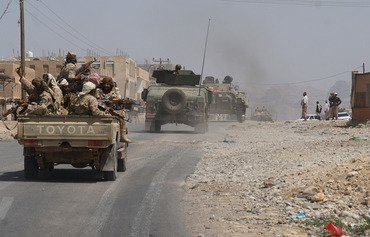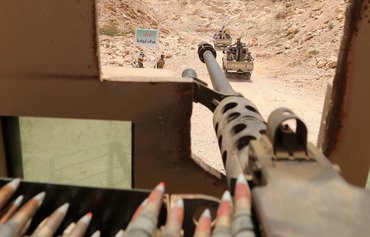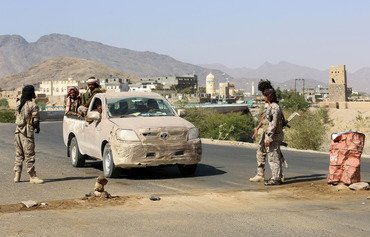A campaign to ban weapon-carrying in the Shabwa provincial capital of Ataq and other districts has helped establish security and stability and restrict the movement of extremists and outlaws, officials said.
The Shabwa elite forces rolled out a weapon-carrying ban in districts where this issue has been most prevalent and problematic before implementing it in Ataq.
"Weapon-carrying in the provincial capital and capitals of other districts is the direct cause of the disturbance of public peace and prolongation of tribal conflicts," Shabwa deputy governor Nasser al-Qamishi told Al-Mashareq.
An environment that makes it easy for terrorist elements to move around with their weapons has fueled a cycle of vengeance and violence, al-Qamishi said.
![A member of the Shabwa elite forces inspects a vehicle during a campaign to ban weapon carrying that kicked off last August in the Shabwa provincial capital of Ataq. [Photo courtesy of the Shabwa elite forces]](/cnmi_am/images/2019/03/18/17164-shabwa-arms-600_384.jpg)
A member of the Shabwa elite forces inspects a vehicle during a campaign to ban weapon carrying that kicked off last August in the Shabwa provincial capital of Ataq. [Photo courtesy of the Shabwa elite forces]
The campaign to ban weapon-carrying in Shabwa's four southern districts in the last quarter of 2017, after the ouster of al-Qaeda, was an important step, he said.
Shabwa elite forces began implementing it in Rudum and Mayfaa districts in September 2017 and in Habban and al-Rawda districts in October of that year.
The campaign in Ataq, launched in August 2018, came to complement the successes achieved in the district capitals in ousting al-Qaeda and clearing most areas in the province of extremist elements, al-Qamishi said.
Residents welcome the ban
"One of the reasons for the success of the campaign is the positive response from residents and their compliance in not carrying weapons," said Shabwa Elite Forces Commander Lt. Col. Mohammed Salem al-Buhr.
Shabwa residents have suffered the negative consequences of weapon-carrying for a long time, he told Al-Mashareq, noting that they also suffered when al-Qaeda was in control over some areas, such as Azzan.
The campaign has achieved great successes in curbing retaliatory violence among the local tribes and preventing the outbreak of fresh violence, which can occasionally erupt over minor disputes, al-Buhr said.
The weapon-carrying ban has made it difficult for al-Qaeda to carry out assassinations targeting leaders and members of the security forces, he said.
"In the initial days of the implementation of the campaign in Ataq, the number of carried weapons at all points of entry to the city was over 1,000," he said. "Now that figure is down to 100, after the implementation of the campaign in all districts of the province."
"The Shabwa elite forces will not allow the presence of al-Qaeda extremists or outlaws and will do their utmost to protect the lives of citizens," al-Buhr said.
Restricting al-Qaeda's movement
The successes achieved in Shabwa in terms of defeating al-Qaeda and regulating arms carrying were possible "thanks to the efforts of the Arab coalition", said Shabwa Elite Forces in Ataq Commander Wajdi Baoum al-Khulaifi.
The UAE in particular "helped train and equip the Shabwa elite forces with whatever was needed to enable them do their job", he told Al-Mashareq.
Al-Khulaifi said the campaign is continuing in Ataq and other districts of Shabwa province to maintain the security and stability that has been achieved.
This aims to preserve security gains and ensure they remain in place with the co-operation of all security agencies and the Yemeni army, he said.
Shabwa elite forces on Thursday (March 14th) began to deploy to Usaylan district, said al-Buhr.
The elite force now has a security presence in 16 districts of the province, with only two districts remaining; Ain and Bayhan, he told Al-Mashareq.
"Shabwa elite forces have deployed to Usaylan district to crack down on al-Qaeda elements and secure it like all other districts in the province," he said.
"Local residents in Usaylan have warmly welcomed our forces because they are natives of the district," he added.
Shabwa elite forces have already ousted al-Qaeda from 15 districts in the province, he said, and intend to continue until it has been fully routed.








The best solution is to confiscate weapons from civilians and to ban the consumption of kat.
Reply1 Comment(s)